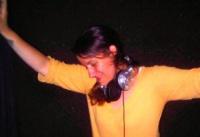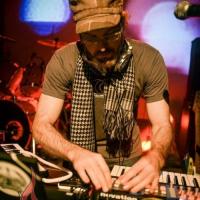
INTERVIEW: Subatomic Sound System ‘Respects the Foundation’ of Dub
Written By Tania Fuentez (TFM)
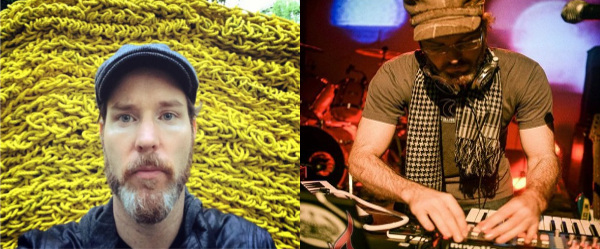
If you haven’t heard them yet, Subatomic Sound System performs as either a DJ, live electronic act, or complete band spearheaded by Emch, founder of Dub Champions Festival and the Subatomic Sound label. He’s producer, DJ, musician, Brooklyn Radio host, label manager for Kingston-based People’s Records JA, Dubspot music instructor and promoter.
An extremely busy man, Emch’s been traveling worldwide spreading the word on all things dub. Subatomic Sound System productions, remixes, and releases include collaborations with icons like Lee “Scratch” Perry, Elephant Man, filmmaker David Lynch, The Slits’ Ari Up, Anthony B, and U-Roy, as well as next-generation pioneers like Jahdan Blakkamoore, Stereotyp, Frikstailers, Dub Gabriel, Liondub and many more. This week, Tania Fuentez Media catches up with him for an exclusive just before Red Bull Music Academy’s sold-out show in New York City.
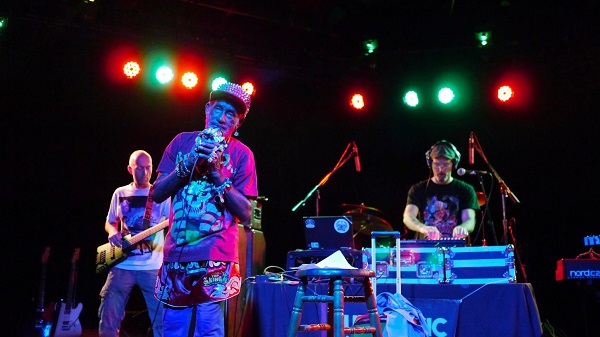
TFM: How has it been on the road collaborating with such a musical legend like Lee “Scratch” Perry? What impressed you most?
Emch: I think what people love about Lee “Scratch” Perry is that he is inspiring. People are drawn to him, whether as listeners or as collaborators, to be inspired. Not only is he relentlessly creative and excited to continue pushing the envelope at the age of 77, which is in itself inspiring, but he also challenges you to become better. He might put you on the spot on stage in front of a few thousand people and ask you to play something that he sings into the microphone right then and there or he may tell you to stop playing something or suddenly change up the program entirely. It’s almost like he’s doing a studio session on stage. He has no fear of failing, partly because I think he has the confidence that his experiments will eventually lead to something brilliant, and I feel that in every show, he is experimenting and at a certain point in the show, there is always a moment where everyone in the room just feels it, and everything clicks.
After one of the first shows we did, I asked him how he felt about it and what I could do better. He said “Remember the other night when we were flying?” I did, it was during one of those moments where everything was clicking and he had asked the whole crowd to put out their arms like birds. He held up his finger like Yoda and said, “Remember that feeling. Balance!” I nodded. He nodded. Then he turned and wheeled his crazy little wheelie bag onto the plane.
I heard a story that during the recording of Bob Marley’s Sun is Shining, he walked up to the drummer, picked up the Hi-Hat cymbals and walked out of the room, then told them to play the song again. Interestingly, that recording has no Hi-Hat and I think that contributed greatly to the open mystical feeling of the tune, just driven by the pulse of a bubbling organ and guitar. He told me once that he constantly revises his material to keep it fresh and exciting so that he can deliver it with the immediate emotion he is feeling, and I think that is important to note in a world where so much music performance is pre-programmed and rigidly rehearsed these days.
All that is why he has the respect of so many people he has worked with over the years, not just reggae musicians, but people like Paul McCartney and Keith Richards, which I think underscores how Scratch really transcends any genre or any kind of definition of producer or artist. In the recent Marley documentary, he was very prominently featured as a crucial guiding force that pushed Bob Marley to greatness, but that is only one example.
TFM: When did you first meet him?
Emch: I connected with Lee “Scratch” Perry through a band called Dubblestandart from Vienna that had worked with Perry since 20 years back and were doing an album called, Return From Planet Dub, in 2008. I was playing guitar for them on tour but they liked the production I was doing with Subatomic Sound System and asked me to do some dubstep remixes, the first Perry foray into the dubstep genre. First one was a limited edition vinyl called, Iron Devil, also featuring Prince Far-i that we put out limited edition 12″ vinyl and it blew off shelves immediately. A store in Japan told me it was the fastest selling record they ever had in their store. We did a few more, Respect the Foundation, that featured Jahdan Blakkamoore then, Chrome Optimism, that also featured David Lynch, then a 7″ that featured Ari Up called, Hello, Hell is Very Low b/w Bed Athletes. Along the way this led to some shows in NYC, at Brooklyn Yard, where we first met, then the next day at Summerstage in Central Park for a capacity crowd, what I was told was the biggest turnout of the summer. There is a little film on YouTube documenting some of this.
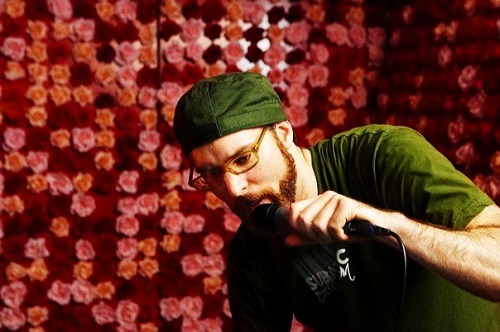
TFM: Did the Coachella experience live up to all the hype? Who really took your breath away, if there was time to catch other acts.
Emch: Coachella was amazing and it did live up to the hype. 95,000 people, 180 bands, sold out, in a beautiful setting in the desert? What was incredible is that we got to play it twice, two weekends in a row!! It was the first show of the tour and one of the last, and we had an incredible week of musical evolution in between those shows. First weekend was great, but second weekend was bananas and I could really feel that things clicked with the crowd that second weekend. Normally we play to a Lee Perry crowd or at least a reggae crowd, but Coachella is a diverse crowd and reggae is not really on most people’s radar — so Lee Perry’s history wasn’t really a factor for most people in the audience. They just took it at face value. It’s a younger crowd too, so many didn’t know Lee “Scratch” Perry or even Bob Marley for that matter.
We had a great time-slot right at sunset, and we played a really diverse set reaching from classic material Lee did with Marley and Max Romeo to the latest beats we cooked up and remixed with his Black Ark recordings. I just connected with people. At the time, it felt like the culmination of a life’s worth of work, to get to a point to be able to make that happen. Besides Lee on the mic and me on the electronics, beats, melodica, dub mix and all that, we had Paul from Dubbletandart on bass, Larry McDonald on percussion, a legend in his own right, and a veteran of Lee’s Black Ark studio days in Jamaica, plus we had two amazing backup singers, Chezere (who has worked with the Roots and Don Letts) and Amanda Bauman.
TFM: For the uninitiated, what exactly is Subatomic Sound System and what’s in store for the future?
Emch: Basically this: NYC’s Subatomic Sound System is a tightrope between the reggae roots of dub and the future of bass music. After collaborating with Dubblestandart in 2008 to produce Lee “Scratch” Perry’s first dubstep tracks, numerous projects followed; Subatomic Sound System, with a unique blend of live instruments and electronics, has become Scratch’s go-to band for reinventing the Black Ark vibes on recent tours, including his 2013 Coachella appearances.
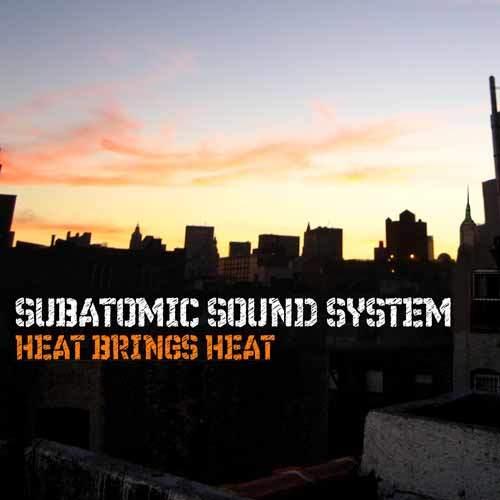
TFM: Where do you find inspiration? Are there times you get tired of the grueling demands that come with running an indie band?
Emch: Being able to work with Lee “Scratch” Perry and perform at Coachella is an incredible source of nourishment for the soul, but just as much is going to far corners of the world or getting messages and stories from people in Russia, India, Mexico, Brazil, Colombia, Argentina, Africa, Japan and finding the music has reached there and matters to people at a really grassroots level, inspiring them both lyrically and musically. The project we did with Anthony B called, Dem Can’t Stop We From Talk, on a riddim called NYC-2-Africa was one example, where the defiant message against politicians resonated around the world at a time with the Arab spring was kicking off and people were just fed up with their so-called leaders. The Internet has made that reach possible. A lot of it is bootlegging. We don’t see it in sales, so it’s not huge financial rewards, but as long as we can survive and push forward and grow, that’s all we need to continue. Life in NYC is not easy for a musician. We’re side by side with the rats and cockroaches. It’s good to get out of here and know that our music has made us friends in other places. I’m really excited about work I’m doing with Delhi Sultanate from India and his whole crew.
Of course, it’s demanding and hard to be independent, but that’s all there is these days and we have to find a way to survive and build from here. There are so many logistics and so much business that you have to deal with just to keep your head above water in this collapsed music industry. When it comes time to make the music, sometimes it feels like you had to run a marathon just to get to the starting line! I joke with fellow musicians that our working conditions and pay is on par with the worst sweatshops. We are grinding 24-7 and there are no sick days, health insurance, or retirement plan. We are living on the edge. Any money we get goes immediately back into our art, often times paying collaborators and spreading it around, because that’s the only way to keep pushing forward, by building community and encouraging participation. There isn’t any big record label keeping us afloat. It’s just us. There isn’t any room for being lazy or resting on past achievement. You need to be aiming to break new ground, take it to a higher level, and blow people’s minds every time, or else you become irrelevant in the blink of an eye.
TFM: What’s your take on the rise of EDM? Are a lot of people still confused about the roots of dubstep?
Emch: It’s fine with me. It’s a ridiculously general catch-all name, but that is typical of the music industry and curiosity is good in general. To counteract people not knowing the roots of dubstep are very much from dub reggae and not understanding the long path this so-called new genre has traveled, I have been putting on an annual festival called Dub Champions Festival, founded in NYC (and coming up here in September again) but expanding to other cities around the world, like Vienna, where we had an amazing time in February and hopefully Brazil, India and possibly Amsterdam.
I do my part to let people know the history of the music as it relates to a history where a lot of people, including Lee “Scratch” Perry, don’t get the recognition they deserve. It was great to play at Coachella this year and have a really diverse and mostly young audience rocking out to Lee “Scratch” Perry, especially the second weekend when we dropped some crazy bass music and a rendition of a dubstep track called, Vampires & Informers, that we had done with Elephant Man. Ironically, Skrillex had a trailer next to us in the Coachella backstage area, but I didn’t see him come by to acknowledge Mr. Perry. Maybe he did, but in general a lot of young artists present their sound as something entirely their own and don’t acknowledge who they stole it from. I have a problem with that. It’s why we did the remix with Perry called, Respect the Foundation.
Recommended:
Red Bull Music Academy New York 2013:
http://www.redbullmusicacademy.com/home
Tania Fuentez is a New York-based professional journalist specializing in fine art photography, creative writing and visual arts, providing an outlet for all forms of independent, underground art.
You can contact her at:
tania@taniafuentezmedia.com.
PORTFOLIOS:


